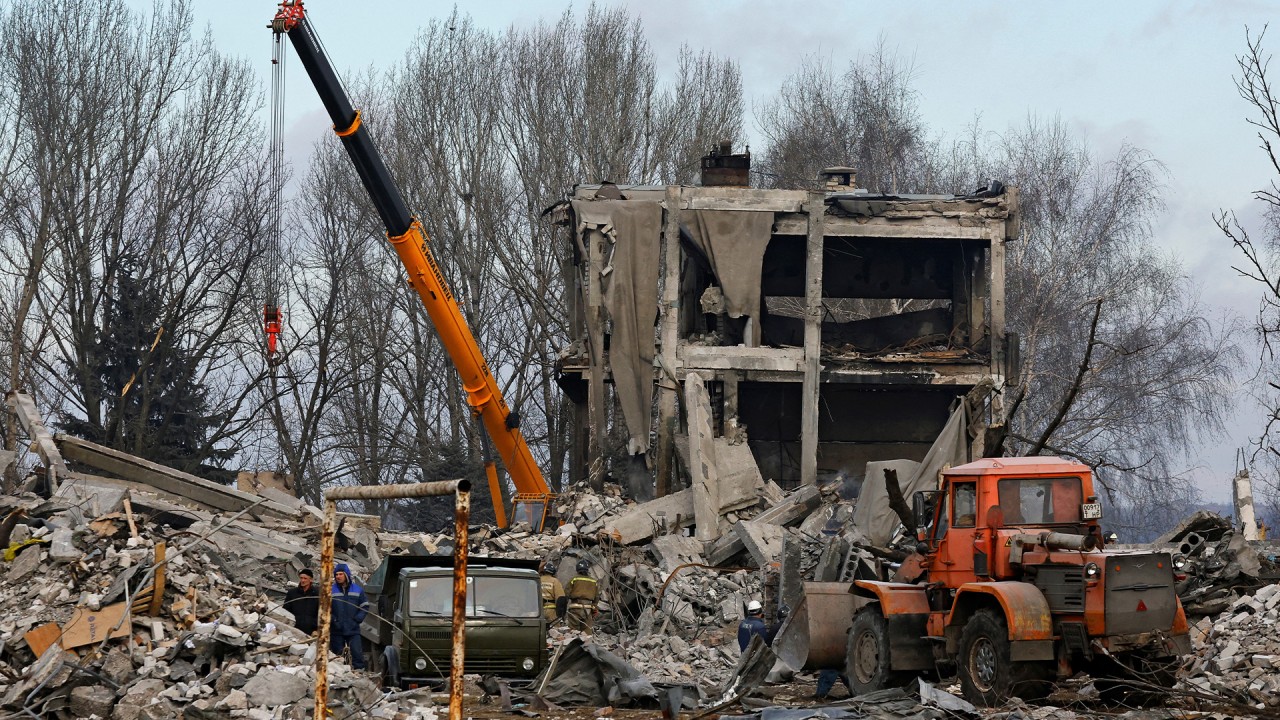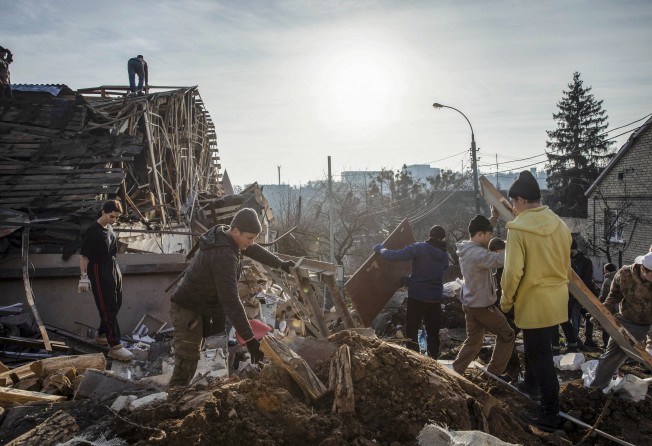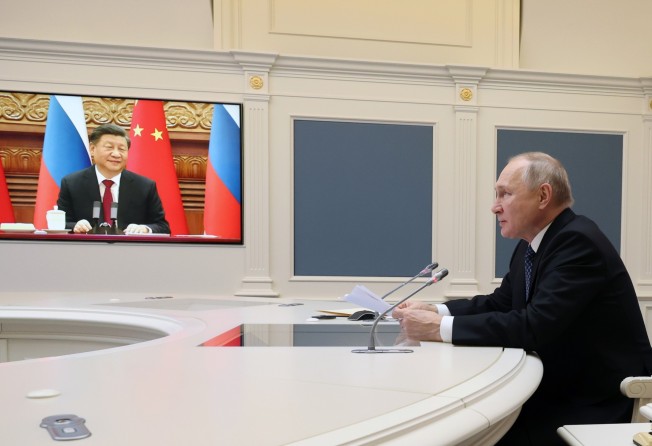
01:45
Russia says 89 killed in Ukrainian attack, blames mobile phone use

Further prolonging of the war in Ukraine could push China to become a mediator for the sake of strategic interests, but the strength of Beijing’s commitment to or influence on Moscow remains to be seen, experts say.
Almost a year on since the Russian military invaded, hostilities in Ukraine show no signs of coming to an end.
In a year-end video call with Russian President Vladimir Putin on December 30, Chinese President Xi Jinping praised him for not ruling out a diplomatic solution to the conflict, days after the Russian leader said he was ready to negotiate with all relevant parties.
Xi also said China was willing to play a constructive role in resolving the conflict.
But Russian missiles have continued to hit residential and energy infrastructure, while Russia said a Ukrainian missile strike around midnight on New Year’s Eve killed 89 of its soldiers in the Donetsk region.
Many see China as being engaged in a balancing act between the West and Russia – adjusting its position over the course of the war.
After its declaration of a “no-limits” partnership with Russia and refusal to condemn Moscow were subjected to harsh scrutiny by the West, China recently became more outspoken in warning against the use of nuclear weapons, with Xi also being pressed by the European Union to use his influence on Putin to help to end the war.
But while China has signalled its willingness to be a mediator, experts said the timing and conditions for it to assume such a role were not yet in place.
Iliya Kusa, an international politics expert at the Ukrainian Institute for the Future, said he believed China was willing to mediate in the Ukraine conflict due to some strategic considerations, including concerns over the expansion of US security partnerships around the world and the spillover effects on China’s economy.
“War in Ukraine gave the United States additional opportunities to rally allies in Europe and Asia, mobilise resources and expand Nato-led partnerships, which is contrary to China’s interests,” he said.
China’s economic growth rate last year is expected to have been the lowest in decades and its relationship with the US has also deteriorated amid increasing restrictions on access to hi-tech components and rivalry in the Indo-Pacific region.
But China has benefited from purchases of discounted Russian oil and gas, whose prices have fallen due to Western sanctions.
Russia overtook Saudi Arabia as China’s largest oil supplier for a number of months last year, when China-Russia trade was expected to have grown by about 25 per cent to a record high.
Kusa said China would be able to mediate in the conflict due to its economic and energy leverage over Russia, good economic relations with Ukraine, and influence over non-Western countries, but its involvement would depend on the dynamics of the China-US relationship in the coming year.
“China will be ready to press Russia only if the US is interested in involving China in talks about a possible post-war security architecture,” he said. “For example, they could agree on jointly containing Russia diplomatically, politically and economically, but this would require Washington and Beijing to engage in a meaningful dialogue. Right now I don’t see that happening.”
Wang Yiwei, an European studies professor at Renmin University in Beijing, said China had little power to stop Russia from fighting, and Moscow would not give up on the war.

“China is not an involved party, so there is nothing it can do about it,” he said. “It’s wishful thinking from the West, hoping that China will put pressure on Russia.”
Wang said China would not have much of a role in arranging a ceasefire or negotiations until Russia and Ukraine were ready to sit down for talks, such as, for example, by calling for the principles of the UN Charter to be upheld.
Negotiations between Ukraine and Russia have been largely stalled since a few rounds of talks in March last year. Many observers doubt either side has much interest in restarting them any time soon, with Ukraine having recaptured more occupied territory in recent months.
Yun Sun, director of the China programme at the Stimson Centre, a think tank based in Washington, said China’s mediation would depend on whether Russia and Ukraine were ready to settle their conflict, and whether they agreed on China being a mediator.
“For China to mediate will require the consent from both sides to talk about peace and for China to be the mediator,” she said. “I don’t think we are there yet. If Europe pushes China to mediate, Beijing will be more eager to consider it.”
Zha Daojiong, an international relations professor at Peking University, said the resolution of the Ukraine conflict would require diplomatic efforts by multiple parties, including Nato, and it would be best for China to “observe calmly and act steadily” before any involvement in the process.
“Political-diplomatic dynamics among the direct parties of the conflict are going to be the driving force of change,” he said.
“In other words, even in the event of a formal request for a role, China should be prudent – by consulting, for example, with all those direct parties before firming up a position of its own.”
Calls have grown among EU members for an expanded Chinese role in resolving the conflict. The new Chinese ambassador to the bloc, Fu Cong, said the conflict had put China “in a very difficult position” and “put a lot of strain” on China-EU relations.
Philippe Le Corre, a Harvard Kennedy School research associate who specialises in Sino-European relations, said he believed the war’s impact on Chinese projects in Europe had put further pressure on already strained economic relations.
“Due to the Ukraine war, the Belt and Road Initiative is stalled and many of the Eastern European countries have lost hope to receive Chinese foreign direct investment … a strong message from Beijing to encourage the end of the Ukraine war would help China’s image greatly in Europe,” he said.
China-Europe Railway Express services have been curtailed after the Ukraine section was severed, and many European operators have opted out of transport through Russia and Belarus due to sanctions on Moscow.
Further investment in the New Eurasian Land Bridge route that would have passed through Russia has also been halted, with China now focusing on a shorter alternative route to Europe through Kyrgyzstan and Uzbekistan that would bypass Russia.
The land bridge is one of six key economic corridors under the belt and road plan that connect China and Europe.
Chinese investment in Europe has also been declining amid growing pandemic and security concerns.
However, overall trade between China and Europe still showed strong resilience last year – growing 8.1 per cent year-on-year in the first 10 months – with most cargo shipped by sea.
EU-China ties have shown signs of warming in recent months despite tensions over Ukraine, human rights and economic overdependence.
Xi discussed cooperation with several EU leaders during the G20 summit in Indonesia’s Bali in November, and subsequently hosted German Chancellor Olaf Scholz in Beijing, followed by European Council President Charles Michel in December.
Wang said he expected China’s relations with the EU to improve in the coming year despite their different approaches towards Ukraine.
“The EU has already realised that China cannot deliver what it expects,” he said. “And unlike before, it will not ask China to express its stance first before talking about other things. They should cooperate on the areas they are able to and should not get emotional because China’s position is different from theirs.
“The human rights dialogue is now to be restarted. So if there is any dispute or problem, let’s talk it out first, and not be restrained by the Ukraine issue.”